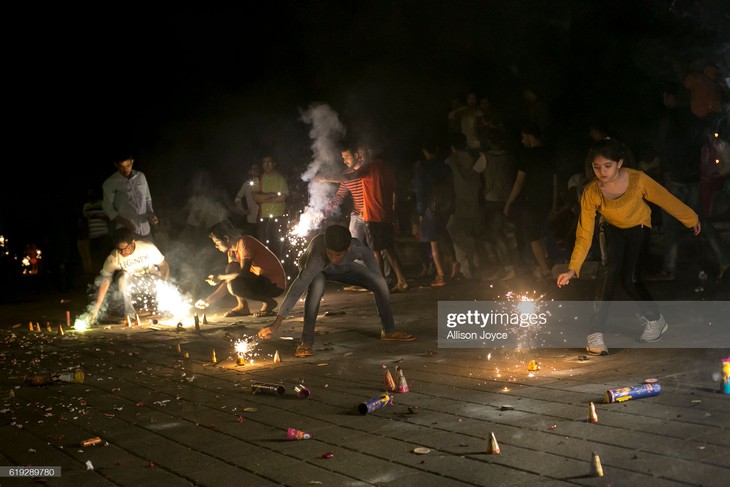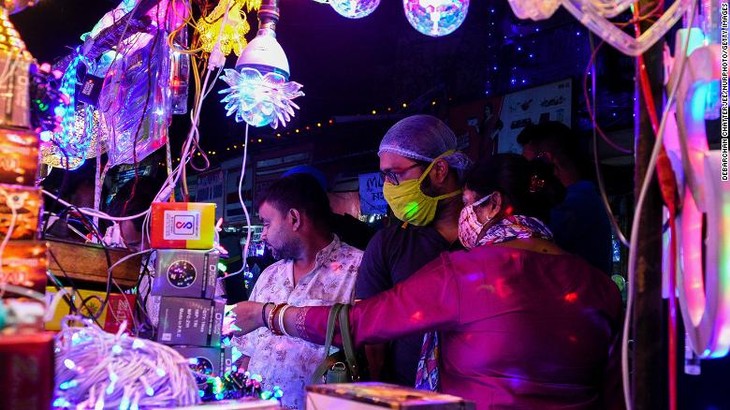(VOVWORLD) - Diwali, the festival of lights, is celebrated across India with great enthusiasm as it symbolises the victory of good over evil. Marking the return of Lord Rama to Ayodha after 14 years of exile, Diwali has been celebrated since time immemorial. How the festival has changed over time, Dr Manasvini Yogi, an officer on Special Duty at the Delhi School of Journalism under the University of Delhi, will tell us.
 (Photo: Sanjay Kanojia/Getty Images) (Photo: Sanjay Kanojia/Getty Images)
|
Bao Tram: Hello, Dr Manasvini Yogi. Thanks for joining us today.
Manasvini Yogi: Good morning everyone in Vietnam who will be listening to this program. I’m happy to be here to share my country’s very important festival, Diwali.
Bao Tram: What is Diwali festival?
Manasvini Yogi: Diwali is a very important festival of India. Diwali (or Deepavali in Sanskrit) literally means "a row of lights" which is the biggest in India, which honors the victory of good over evil and brightness over darkness.
 (Photo: Allison Joyce/Getty Images) (Photo: Allison Joyce/Getty Images)
|
Bao Tram: Can you briefly tell us the origin of Diwali?
Manasvini Yogi: According to the great Indian Epic, Ramayana-Dasharath had three queen consorts, namely, Kaushalya –Dasharatha's Chief Queen – Sumitra, and Kaikeyi. The latter two of them were other Queen consorts, but they were not Chief Queens.
A maid of Queen Kaikeyi named Manthara convinced her that the throne of Maharaja, the King of Ayodhya, belonged to her son Bharata and that her stepson-crown prince Rama (the hero of Ramayana)-should be exiled from the kingdom.
As a result of the evil desires of Kaikeyi, Rama was banished into the jungle for 14 years. Lakshmana and Sita because of their love and devotion towards Rama went along with him. From here the origin of the Diwalli starts because when Rama returned to Ayodhya after 14 years of exile, the whole country, whole cities of Ayodhya, celebrated his return. The celebration of his return is called Deepavali or Diwali.
Bao Tram: Why is it important to Indians?
Manasvini Yogi: The importance of the Diwali festival for Indians is that all people on the Diwali festival worship a goddess called Lakshmi. Whatever we suffer, whatever obstacles come in our life Goddess Lakshmi and Lord Ganesh are supposed to be the removers of those obstacles. It is also believed by the Indians that Goddess Lakshmi will visit every home during the Diwali period, bringing with her prosperity and good fortune.
Bao Tram: Is this festival only for Hindus or is it celebrated all across India?
Manasvini Yogi: It is not only celebrated by the Hindus, it is celebrated all over India, almost all. Hindus, Jains, Sikhs all celebrate it. And in Kerala, it is celebrated the same day of a festival called Onam. For Hindus, it is a major festival.
|
 The northern city of Ayodhya set a Guinness World Record in 2018 by lighting more than 300,000 lamps for the Hindu festival of Diwali. The northern city of Ayodhya set a Guinness World Record in 2018 by lighting more than 300,000 lamps for the Hindu festival of Diwali.
(Photo: Sanjay Kanojia/Getty Images)
|
Bao Tram: How is the festival celebrated?
Manasvini Yogi: In north India it celebrates the return of Rama and other places also celebrate it in some other forms. Many days before the festival is arriving, people start cleaning their houses, getting them whitewashed because they believe when the house is clean, Goddess Lakshmi will visit them. In all Diwali, Indians decorate their houses with lamps, diyas, burn crackers, make designs on the floor with flowers, with rangoli colors to show the festivity. They distribute sweets to their kids, neighbours, and their relatives. They visit the houses of relatives, offer them sweets and Diwali gifts. People come to other houses to offer Diwali gifts and sweets. The main event goes on for five days basically. It is generally held in October and November of every year, depending on the position of the moon.
 (Photo: Allison Joyce/Getty Images) (Photo: Allison Joyce/Getty Images)
|
Bao Tram: Is there anything else people should know about the festival?
Manasvini Yogi: Diwali is a family oriented festival. The lights make it a very warm and atmospheric occasion. It's observed with much joy and happiness. However, the loud noise of the crackers sometimes is harmful. Crackers create a lot of smoke. So everybody is cautioned to use cracker less now, because of the environment change. There's a lot of smoke and it leads to pollution. I must tell you that this time crackers were completely banned in India. But some children did, you know, because that is their part of enjoyment. So one has to be very careful so that it may not lead to catching fire in the clothes or anywhere. These are the special notes which people are given. Inspite of all that, it's a family event. It's a matter of joy. The whole family gets together, even to the extent that you know people if children are outside India, outside the city, they come back home for holidays during the Diwali. Also during the Diwali occasion, people believe to start a new business, to buy a new home, to go into a new home. You start a new office. It is marked with all these things. Diwali is a special occasion.
|
 A couple shopping for decorative lights at a market in Kolkata. A couple shopping for decorative lights at a market in Kolkata.
(Photo: cnn.com)
|
Bao Tram: What do people do on that day?
Manasvini Yogi: On the Diwali, people do a lot of shopping. But the traditional way of celebrating Diwali was with only diyas displayed all over the house, in your balconies, in your rooms, in everywhere outside the house. But today along with those traditional preparations, some new things have come up. Because you know putting the earthen diyas all over the places becomes a little bit difficult for everyone. People have started using the things like bulbs, flowers and the houses decorated with that. But to keep the traditional thing in, we do put some diyas too in front of the goddess, but outside we put bulb strings, light strings, and the strings of flowers. So that the house looks beautiful. But the puja, the traditional way of worship of Goddess, is still done by each and every Hindu who celebrates the Diwali because that is the main thing to worship Goddess Lakshmi. That tradition still continues in every household. So certain conditions are there, but certain traditions along with the time, with the modern time, have changed.
Bao Tram: It hasn’t been a great year so far, we all know that. But we have always managed to survive, to sustain, and to celebrate the little happiness. Like the Diwali, let the lights glow and smiles grow. Thank you so much, Dr Manasvini Yogi, for joining us today and sharing with us some facts about Diwali, a major Indian festival.
Manasvini Yogi: Thank you so much.